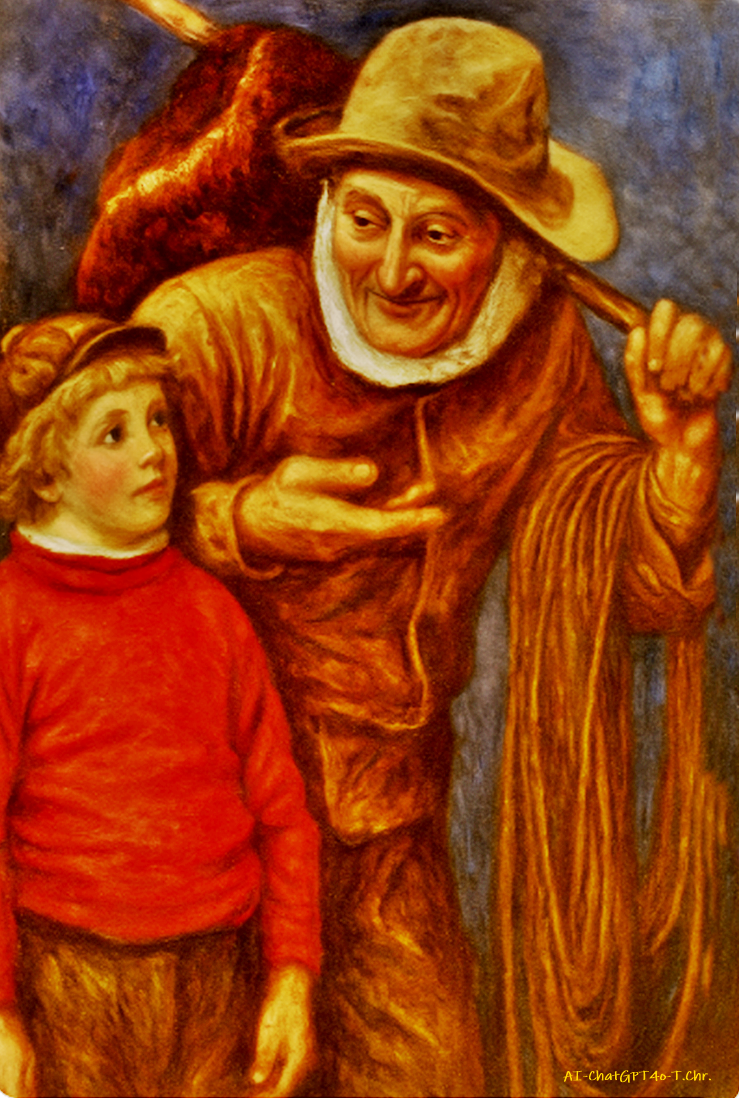"The Rope and the Sea"

By AI-ChatGPT4o-T.Chr.-Human Synthesis-17 July 2025
An old fisherman’s tale for young hearts
The sea wind had grown softer that morning in the quiet coastal village of Breidvik. Nets hung drying on weathered posts, and the smell of salt lingered over the docks like an old memory.
Young Emil stood near the edge of the quay, his cap slightly askew, and his cheeks still rosy from the brisk walk with his grandmother. His eyes sparkled with questions that hadn’t yet been asked.
That’s when Old Mikkel appeared, his figure leaning slightly from the weight of the coiled rope slung across his back. He wore a faded oilskin jacket, a woolen neck wrap, and a hat shaped by years of weather. His face, lined and sun-browned, held a grin that always seemed ready for a story.
"You're up early, lad," Mikkel said, his voice as textured as driftwood.
"I wanted to see the boats leave," Emil replied. "But it looks like they’ve all gone."
"Aye, like fish slipping past your fingers," the old man chuckled, setting his rope down with care. "But there's still something to see—if you’ve got a moment for an old sailor’s tale."
Emil nodded eagerly.
Mikkel crouched beside him, hand gesturing toward the open sea.
"See that line where the sky kisses the water? That’s not just the end of the world, boy. That’s where the real stories begin. Long ago, I was about your size when I first heard the call. The sea doesn’t shout. No. She whispers. She waits."
He leaned closer.
"I once set out to catch the biggest halibut anyone had ever seen—so big it could feed the village for a week. But it wasn’t the fish I caught. It was a storm. She came up like a wild horse, thrashing waves taller than the mast, and thunder cracking so loud it split my heart in two."
"What did you do?" Emil asked, wide-eyed.
"I listened. Not to fear, no. I listened to the rope." Mikkel held up the coil slung across his back. "This old thing saved my life. I tied it to the mast, to my waist, and to hope. It held me steady. That’s what ropes do, Emil. They hold what matters—your boat, your nets, and sometimes, your courage."
Emil touched the thick rope gently.
"So I carry it still," Mikkel said, smiling. "Not because I need it, but to remember what I learned: You don't need to be the strongest. Just tied to something that holds when the sea gets rough."
Emil’s eyes stayed on the horizon. The wind tugged gently at his cap.
“I think I hear it,” he whispered. “The whisper.”
Mikkel’s eyes twinkled. “Then you’ll do just fine, sailor.”
And with that, the old fisherman rose, slung the rope over his shoulder once more, and walked off—leaving behind not just footprints in the dock’s damp wood, but a tale anchored in a young boy’s heart.
Some ropes hold ships. Others hold stories.
"The Rope and the Sea" — Part II
“Some ropes hold ships. Others hold stories.”
That night, Emil sat by the fireplace, the flames dancing in his eyes while his mind replayed every word Old Mikkel had said. He could still hear the hush of the sea, the scratch of Mikkel’s voice, and feel the heavy truth in the old rope's fibers. His grandmother watched him from her rocking chair.
“You’ve got the look,” she said with a knowing smile.
“What look?”
“The one your grandfather had the day he first set foot on a boat. Like the sea whispered something only he could hear.”
Emil turned back to the fire, holding the moment close.
The next morning, he ran down to the pier with a small notebook and a length of twine he had found in the shed. Old Mikkel wasn’t there. Just the sounds of gulls and the creak of boats swaying in their moorings. But something had changed.
Emil began talking to the fishermen—asking about knots, sails, tides, and the stars. Most gave short, amused answers. But over time, they saw he was serious. His hands were small but learned quickly. He practiced tying knots until his fingers ached and read the weather like a boy possessed by wind and water.
Mikkel watched quietly from a distance.
One cloudy afternoon, a call rang out: “A storm’s brewing out west!”
Boats came rushing in, nets abandoned, sails lowered. But one skiff—a small one—was still out past the rocks. Emil recognized it. It was Olav’s, the fishmonger’s son, who had only just begun learning to fish alone.
Panic struck the harbor.
Without a second thought, Emil grabbed the old twine he had been practicing with and tied it around his waist, then around a thick piling on the pier. He motioned for a borrowed rowboat.
"You’ll never reach him!" someone yelled.
But Old Mikkel stepped forward, silent and steady, and placed a firm hand on Emil’s shoulder.
“Go,” he said. “You’re tied to something strong.”
The waves thrashed, but Emil rowed with fury. The boat pitched, spray slapped his face, and every muscle burned. He reached Olav just as the boy’s skiff was taking on water.
“Grab the rope!” Emil shouted, tossing the end of his lifeline.
With the strength of desperation and something greater—hope—they pulled together. Inch by inch, they were drawn back toward the safety of the pier, where the villagers stood, pulling in the other end with tearful, cheering hands.
When Emil climbed out soaked and shaking, Mikkel wrapped his old coat around him.
“You listened,” the old man whispered. “To the sea. To the rope. To yourself.”
Years passed. Mikkel’s steps grew slower, and his stories longer. One day, he handed Emil that thick, weathered rope.
“I won’t be needing it where I’m going,” he said. “But someone will. When they’re scared. When they’re ready.”
And now, in Breidvik, when storms roll in and boats stray too far, there’s always someone by the dock—calm, steady, and strong. A grown man with a twinkle in his eye and an old rope slung over his shoulder.
Because some ropes, once tied, never truly come undone.
And the sea still whispers.
"The Rope and the Sea" — Part III (Finale)
“Some ropes hold ships. Others hold stories. And a few… hold generations.”
Years turned the little village of Breidvik into something softer, slower. The paint peeled more from the boats. The gulls seemed to cry a little longer. And though storms still came and went, people didn’t fear them the same way—not since Emil had become a name children spoke with awe, the way they once had with Old Mikkel.
Emil never sought that. He simply stayed—tied to the sea, to the people, and to the rhythm of tide and wind.
One crisp morning in early spring, the kind where the sea looked like burnished glass and the air smelled faintly of pine and salt, Emil sat by the pier with a little girl beside him—his granddaughter, Liv.
She was tracing circles on a coiled rope, the same one Mikkel had given him all those years ago. It had frayed more in places and smelled faintly of brine and time. But it still held.
“What’s this one for?” she asked, pointing to a knot.
“That’s a bowline. Makes a loop that never slips. We used it to rescue Olav once.”
“Who’s Olav?”
“Someone I saved... and someone who saved me too, in a different way.”
Liv looked up at him, puzzled. “How?”
Emil smiled. “Because every time you pull someone from danger, you leave fear behind too. And you pull yourself forward.”
She turned her eyes toward the sea.
“Does it still whisper?”
“Always,” Emil said softly. “You just have to learn to be quiet enough to hear it.”
Just then, far across the harbor, a small boat capsized. A shout rang out. No panic, but swift motion.
Emil didn’t move—not because he couldn’t, but because he knew it wasn’t his time.
Liv stood up instinctively. “Should we help?”
“No,” he said, his voice calm. “Look.”
From the dock, a boy not much older than she was already had the rope. He tied it around his waist and tossed the other end to the wind, calling to a friend. The villagers moved smoothly, without chaos. The rope was pulled. The boat rescued.
And Emil’s heart filled, not with pride, but with peace.
That night, as the stars glinted over the waves and the boats rocked gently in their berths, Emil sat by the fireplace, Liv curled beside him, the old rope across their laps like a sleeping dog.
“Grandpa?” she asked sleepily.
“Yes?”
“Will I have a rope one day too?”
Emil kissed her forehead and smiled.
“You already do, little sailor. You just haven’t found where it begins.”
Somewhere beyond the horizon, Old Mikkel was smiling.
Because stories tied with care, like knots well made, never come undone.
And the sea…
The sea remembers them all.
– The End –
